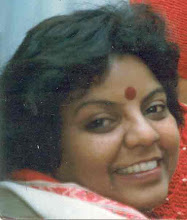 A painting by Prem Singh
A painting by Prem SinghA story by Nirupama Dutt
She looks ancient. She may be seventy or even eighty. Her wrinkled face, yellowing white hair, broad frame and sagging breasts make it difficult to pinpoint her actual age. She squats on the floor of the bus shed, her legs draped in a salwar wide apart and her flabby belly hanging in the middle, waiting for a bus.
She grumbles as she waits, cursing the buses for their erratic habits. She seems to know these buses well. She is going about all the time in buses. Sometimes to the grain market to get her groceries. Or to her daughter's house. Or to her nephew's house and to reach there she has to change two buses.
She carries on her monologue, oblivious of the people around. Her Punjabi is not of the local dialect. She speaks in sing-sing notes and a lingering drawl peculiar to the Punjabi spoken in West Punjab, left behind in Pakistan. My mother used to speak just thus till we teased her out of it.
I interrupt her monologue by asking her where she comes from because her accent is familiar. She is very pleased that her boli has been recognized and says with pride that she comes from Campbellpore and is overjoyed to know that I have a distant association with her land.
After that she all nostalgia. Campbellpore was like this and it was like that. They had a big house there ad plenty of cattle. Those were good times. She is scornful of Chandigarh. This is no place to be in but what can one do. Her Campbellpore she says was the real Punjab. The partition snatched away all her joys.
Her ramblings are interrupted once again by a woman, obviously from her neighbourhood, who asks her if she is going to the grain market and if she can bring some vegetables for her. The lady from Campbelpore gives a curt `no' and turns to me once again.
See what kind of people one has to meet here? They will talk to you only if they want something. Campbellpore was different. The people there were good. Whether they were Muslims or Hindus. They were the real Punjabis. Here the folks are so mercenary. Her daughters-in-law are from these parts. And what mean wenches they are! They have snatched away her sons and now want to polson her. So she stays separately in the annexe and cooks her
own food lest they poison it.
And then it is to Campbellpore again. The fields of corn, sugarcane and `saag'. The Muslim farmers were so good. We could go to their fields and take what we wanted. They turned bad after the partition. They got our houses and cattle. We had to leave our land to them. And, she adds in a hushed tone, the `Angrez' caused it all.
The buses will not ply in the city today, we learn. There have been clashes and some buses have been burnt.
The lady from Campbellpore is worried again though she decides to walk down a distance with me. It was just like this, those days. She has seen it all. She has known death and loss. Hed `Lalaji' was killed in the riots of 1947. She calls her husband `Lalaji' because she is not shameless like her daughters-in-law. Who call their husbands by their names. What have her daughters-in-laws seen of life! They have youth and think it will last forever. Their brothers and nephews are alive so they think there is no death!
She is angry with everyone –her daughters-in-laws, the partition, the people who kill and loot. Only her sons are good but poor fellows they are in the hands of the witches they have married. And now buses are being burnt. People are being killed and there is curfew at nights. She shudders saying that it is so much like that time when a bullet went through `Lalaji's chest and she had to leave her Campbellpore.
She trudges along with me, looking sometimes to her left and sometimes to her right. Her wrinkles look puzzled. What is all this happening to Punjab again? The `Angrez' have long left. So who is the culprit now? This is the only answer she has sought so far. Till now she thought she knew everything.
As we part she tells me that if I come to know of the culprit. I must tell her. And then adds that she hopes she will not have to leave Chandigarh as she left Campbellpore. Her daughter-in-laws would only be too glad to see her off. But she is old now. After Campbellpore she lived in Amritsar for a few years and then came here. She is too old to leave Chandigarh. And for a moment the city becomes as dear to her as her Campbellpore.

Hi, really nice blog. Stumbled on it through a link on Mr Moudgil's blog :)
ReplyDeletepity there are not many nirus to feel and share the unfathomable hurts - so complicatedly hidden or preserved so as to understand the unreasonable - of our wise old people
ReplyDeleteThanks Manumode and Moudgil. This was written for Indian Express in early 1984. In fact there is a trilogy and the other two are 'Prisoners of Hope' and 'In a Ten Marla House. I will search them out.
ReplyDelete